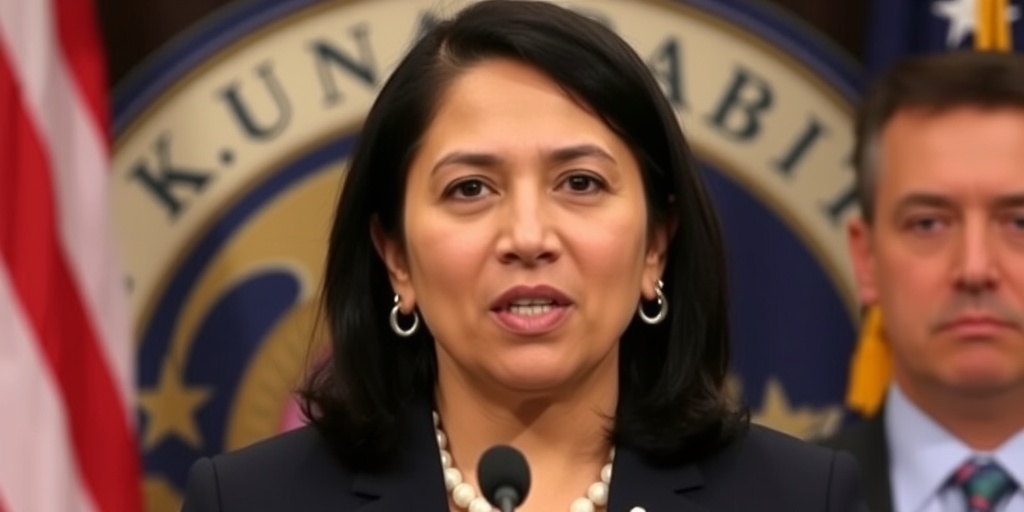Now Reading: U.S. Military Dismisses Greenland Base Commander Following Vance Visit
-
01
U.S. Military Dismisses Greenland Base Commander Following Vance Visit
U.S. Military Dismisses Greenland Base Commander Following Vance Visit

U.S. Military Removes Commander at Pituffik Base in Greenland
In a significant and controversial move, the U.S. military has removed the commander of the Pituffik base in Greenland, following concerns over actions perceived as contradictory to President Donald Trump’s agenda. The removal of Colonel Susannah Meyers was announced by the U.S. Space Force in a statement shared on social media by Sean Parnell, the communication director for the Pentagon. This decision underscores the heightened political sensitivities surrounding military operations under the current administration.
The statement from the Space Force did not provide specific details regarding the rationale behind Meyers’ dismissal. However, Parnell emphasized that any actions undermining the chain of command or subverting the President’s agenda would not be tolerated. This reflects a broader trend observed in the military’s culture, particularly under the Trump administration, where loyalty to the president appears to extend into the ranks of military leadership.
The announcement coincided with heightened scrutiny of military commands and their relationship with political figures, particularly in the context of claims made by the Trump administration regarding national security interests. Colonel Meyers’ removal follows her decision to distance herself from Vice President JD Vance’s recent visit to the Pituffik base. During this visit, Vance spoke about Trump’s interest in Greenland, a semiautonomous territory of Denmark, suggesting U.S. intentions to enhance military presence there for national security reasons.
Reports indicate that following the Vice President’s remarks, Colonel Meyers emailed base staff on March 31, clarifying that the concerns expressed during Vance’s visit did not reflect the views of the base leadership. This attempt at maintaining an apolitical stance appears to have prompted her removal, illustrating the challenges faced by military leaders as they navigate the intersection of political directives and professional military conduct.
During his visit, Vance had criticized Denmark, accusing the nation of failing to invest adequately in the safety and security of Greenland. His remarks were met with disapproval from Danish officials, with Foreign Minister Lars Løkke Rasmussen asserting that such statements do not align with the diplomatic tone expected between allies. This incident points to the delicate balance of diplomatic relations and military operations, particularly as the U.S. seeks to assert its interests in strategically important regions.
The ensuing backlash has sparked broader discussions about the role of military personnel in the political landscape, particularly regarding their duty to remain nonpartisan. The Space Force’s reminder that commanders are expected to uphold high standards of conduct emphasizes the importance of maintaining this impartiality, especially given the contentious political climate. This situation poses critical questions about the implications of political influences on military leadership and the potential repercussions for officers who attempt to uphold their professional responsibilities.
Colonel Meyers has been leading the 821st Space Base Group, responsible for operating the Pituffik facility, since her appointment last July. In this capacity, she has overseen not only U.S. military personnel but also civilian contractors hailing from Greenland, Denmark, and Canada, who play vital roles in the daily operations of the base.
The Pituffik base is strategically significant, primarily as it offers a location for U.S. military operations in the Arctic region. The increasing focus on Greenland and its geopolitical importance has been a topic of ongoing discussion, particularly with the backdrop of climate change and the melting Arctic ice, which is opening new shipping routes and resource opportunities.
Following the announcement of Colonel Meyers’ removal, the Pentagon and the Space Force observed a notable silence, failing to respond to requests for clarification or comment outside of normal business hours. This lack of transparency has bred speculation regarding the underlying issues relating to her dismissal. As the military continues to navigate its role amid the ever-evolving political landscape, the fate of military leaders caught in the crossfire of political agendas remains a topic of scrutiny and concern.
In summary, the removal of Colonel Susannah Meyers from her command at the Pituffik base illustrates the complex interplay between military leadership and political expectations in the contemporary U.S. military. As the government moves forward with its agenda, the expectation for absolute loyalty to presidential directives raises questions about operational integrity and the autonomy of military personnel in fulfilling their duties. Looking ahead, the broader implications of this incident will continue to unfold, revealing much about the current state of military governance and the relationship between politics and defense in America.
Stay Informed With the Latest & Most Important News
Previous Post
Next Post
-
 01New technology breakthrough has everyone talking right now
01New technology breakthrough has everyone talking right now -
 02Unbelievable life hack everyone needs to try today
02Unbelievable life hack everyone needs to try today -
 03Fascinating discovery found buried deep beneath the ocean
03Fascinating discovery found buried deep beneath the ocean -
 04Man invents genius device that solves everyday problems
04Man invents genius device that solves everyday problems -
 05Shocking discovery that changes what we know forever
05Shocking discovery that changes what we know forever -
 06Internet goes wild over celebrity’s unexpected fashion choice
06Internet goes wild over celebrity’s unexpected fashion choice -
 07Rare animal sighting stuns scientists and wildlife lovers
07Rare animal sighting stuns scientists and wildlife lovers





















